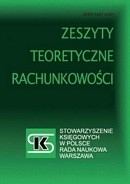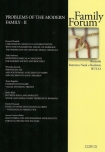












Keywords: attachment; attachment styles; premarital sex; imprinting; proximity
This publication refers to the J. Bowlby’s attachment theory. This theory says that in human there is a biologically conditioned tendency to search and create proximity to significant persons. Followers of Bowlby – C. Hazan i P. Shaver considered romantic relation as an attachment relation. They have found that both in child-parent and romantic relation the same biological system is responsible for emotional and behavioral evolution of relation. The base of attachment is emotional and psychical proximity. In this work it is emphasized how important for creation of attachment in romantic relation first sexual contacts are. It is also underlined that breaking romantic or child-mother relation may provoke serious traumatism. The author of the publication claims that among factors influencing proximity in sexual relation are: emotional proximity, sex (stronger impact in case of women), earlier effort to abstain from this relation (eg. religiously motivated), whether the partner is or is not the first one (stronger impact in case of the first sexual partner).
More...
Keywords: adolescence; illicit drugs; protective factors; parents
The present study used the „CORT 2004 Questionnaire Regarding Risk Behavior for Health in Young People” for an epidemiological survey on 2908 high school students of the urban area of Timis County, western Romania. The aim of this study is to analyze the magnitude of the illicit drug use of Romanian adolescents and to delineate the parental protective factors inside the family.
More...
Keywords: emotion; stress; sex differences; marriage
Presented article includes three psychological phenomena: emotions, stress and interpersonal differences. The article reveals relationships among these phenomena in the context of sex differences. It was hypothetically assumed that there are statistically important differences between women and men concerning the choice of stress coping strategy and that these differences could be caused by different emotions. The results of statistical analysis confirmed the hypothesis and showed that women cope with stress by seeking social support, taking responsibility and escape-avoidance more often than men. Men cope with stress by self-control and distancing more often than women. Different structure of dominant emotions can be the main cause of differences between women and men in their choice of coping strategy. Women experienced high level of anxiety, neuroticism, high emotional reactivity and high level of situational control. Men experienced high level of psychoticism, emotional resistance and high level of emotional expression control. Two types of emotionality were based on separated differences: famine – defined as emotional commitment and masculine – defined as emotional distance.
More...
Keywords: work of creation; ecology; family; natural environment
There is a lot that we can read and speak about ecology today, but also about its crisis. Searching for reasons of environmental degradation we can notice the problem of people’s desire to possess and dominate over creation. Such an attitude of the man is denying the will of God, which was presented to people at the very beginning of their existence: God blessed them and said to them, "Be fruitful and increase in number; fill the earth and subdue it. Rule over the fish of the sea and the birds of the air and over every living creature that moves on the ground." Then God said, "I give you every seed-bearing plant on the face of the whole earth and every tree that has fruit with seed in it. They will be yours for food…” (Genesis 1, 28-29). A new chance for the man and the created world is a family, where the man can experience the presence of God and pursue his vocation of love to the created world. A family and joint actions undertaken give the possibility of changing not only the destroyed nature, but the man as well. The family is the prime performer of God’s command to care about the created world. That is the man living in a family, according to the God’s will, who is supposed to rule over the earth in a responsible way and with love. That is why it so important for a family nowadays, in times of ecological crisis, to live ecologically. Healthy lifestyle together with respect for the whole creation make up a platform for understanding among people and a chance for appropriate implementation of God’s “ecological command”. To fulfill obediently God’s command of human service towards natural environment it is necessary to know what contemporary ecological threats are. One of the ways to protect nature, among many concerns for the work of God’s creation, is an environmental attitude towards procreation, which, in the family, reflects a servant attitude towards others, an attitude which is focused on giving and not on possessing or using. Man’s responsibility for his family „here and now”, but also for future generations that are going to possess the earth with all its stock – good and bad, is enormous. It is all the more necessary to form people’s sense of responsibility for preserving creation, scrupulous environmental attitude and knowledge about possible forms of family involvement in the affairs of ecology. It is necessary to retreat from the way of economical splendor and change the mode of thinking and acting in order to fulfill the assumptions. It is also necessary to realize that the possibility of the cooperation with God in the creative plan of the earth is God’s gift, great privilege for man.
More...
Keywords: Hungary; values; patterns; historical family forms; marriage; divorce; non-marital cohabitation; fertility
According to the regular value-surveys Hungary belongs to the secular-rational and material thinking countries. As a heritage of communism there are a strong basis of paternalist structures and a low rate of trust and social capital. Although family and children are important and central parts of Hungarian value system, there are a high rate of divorces and non-marital cohabitation and a low level of willingness to marriage and childbearing in Hungarian society. Fertility index (1,3) is one of the lowest in Europe. In the background of unfavourable indicators we can find the crisis of values. These values and patterns have formed in different historical situations and effect on people as a special mixture of norms. External circumstances do not allow people to develop their learned values. Women at the labour market are impacted by double pressure: in a modern society after the expansion of higher education they are motivated to work and build a carrier. (It is also a compulsion because of the insufficient incomes.) On the other hand they share traditional values, too: women are responsible for the happiness and cohesion of families. Social problems, uncertain future, inflexible and labile workplaces do not support them to have a real chance for decision. This paper attempts to give a view about the state and roots of Hungarian values in connections with family patterns and also the current demographic trends. State, local governments, NGOs, churches and other actors in the field of social policy have a great challenge to protect and strengthen families for a renewable and sustainable society.
More...
Keywords: single mother; the model of support for single mothers; the long-stay public shelter for single mothers and their children
The model of comprehensive support for single mothers in the Long-Stay Public Shelter in Opole-Grudzice The dynamics of social changes, the emergence of new problems and phenomena concerning single mothers is becoming today an appeal to develop and specify the model of support which shall be provided for single mothers in institutions like long-stay public shelters for single mothers and their children. Particular centres shape their styles of providing care for single mothers and their children. However, there is still no common model of support, which will be appropriate for all kinds of aid institutions. The aim of this presentation is to show the comprehensive model based on personal experiences drawn from over 10 years of commitment in the Long-Stay Public Shelter in Opole-Grudzice. According to the author the essential elements of support are: stages of the stay of single mother in an institution, using of the method of therapeutic community, the conviction that the aid is needed for the whole person. Hence the comprehensive character of the model which aims, by providing appropriate social, psychological, legal, spiritual and educational assistance, at giving residents the possibility of rebuilding the positive picture of themselves and achieving greater psychological maturity to undertake an independent life. Additionally, the essential requirements for the realization of the presented model of support for single mothers – the quality of personnel of these institutions have been discussed.
More...
Keywords: Family ethics; bioethics; same-sex marriages; surrogate motherhood; assisted reproduction; cohabitation; children
The redefinition of family and marriage is an ideological and political topic in modern society, where the public is more and more interested in issues like IVF, surrogate motherhood and child adoption for LGBT couples. What is the definition of family? why is the conventional nuclear family being replaced by new types of households? and what are the potential consequences of redefinition of family for society as a whole? These are some of the most important questions. Family ethics and bioethics could be an excellent framework to present the historical and social background of these kinds of phenomena.
More...